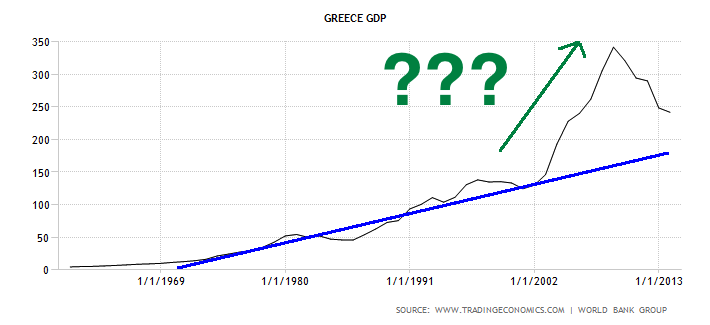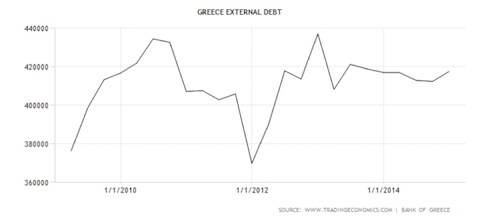Because of the rampant fraud and money printing in the financial system, the real “bottom” or level of “price discovery” is far lower than anyone expects due to the fact that the run up to 2008 was so rife with accounting gimmicks and fraud.
The Greek debt crisis, like all crises in the financial system today, can be traced to derivatives via the large investment banks. Indeed, we now know that Greece actually used derivatives (via Goldman Sachs) to hide the true state of its debt problems in order to join the Euro.
Creative accounting took priority when it came to totting up government debt. Since 1999, the Maastricht rules threaten to slap hefty fines on euro member countries that exceed the budget deficit limit of three percent of gross domestic product. Total government debt mustn’t exceed 60 percent.
The Greeks have never managed to stick to the 60 percent debt limit, and they only adhered to the three percent deficit ceiling with the help of blatant balance sheet cosmetics…
“Around 2002 in particular, various investment banks offered complex financial products with which governments could push part of their liabilities into the future,” one insider recalled, adding that Mediterranean countries had snapped up such products.
Greece’s debt managers agreed a huge deal with the savvy bankers of US investment bank Goldman Sachs at the start of 2002. The deal involved so-called cross-currency swaps in which government debt issued in dollars and yen was swapped for euro debt for a certain period — to be exchanged back into the original currencies at a later date.
The above story for Greece is illustrative of the story for all “emerging markets” starting in 2003: tons of easy money, rampant use of derivatives for accounting gimmick, and the inevitable collapse.
From a big picture scenario, in 2003, the global Central Banks abandoned a focus on inflation and began to pump trillions in loose money into the economy. Because large banks could loan well in excess of $10 for every $1 in capital on their balance sheets, global credit went exponential.
The effect was sharply elevated asset prices that greatly benefitted tourism-centric economies such as Greece.
As I stated in our issue Price Discovery:
If the foundation of the financial system is debt… and that debt is backstopped by assets that the Big Banks can value well above their true values (remember, the banks want their collateral to maintain or increase in value)… then the “pricing” of the financial system will be elevated significantly above reality.
Put simply, a false “floor” was put under asset prices via fraud and funny money.
Take a look at the impact this had on Greece’s economy.
Below is Greek GDP dating back to the 1960s. Having maintained a long-term trendline of growth the country suddenly saw its GDP MORE THAN DOUBLE in less than 10 years after joining the EU?
In many regards, this “growth” was just a credit binge, much like housing prices, stock prices, etc. By joining the Euro, Greece was able to borrow money at much lower rates (2%-3% vs. 10%-20%).
Rather than using these lower rates to pay off its substantial debts, Greece funneled as much money as possible towards Government employees (nearly one in three Greek workers).
As a result, Government wages nearly doubled to the point that your typical Government employee was paid 150% more than his or her private sector counterpart. Add to this a pension system in which retirees are paid 92% of their former salaries and you have a debt bomb of epic proportions.
In simple terms, Greece from 2003-2010 was an economic boom driven by incomes, which were in turn driven by cheap debt NOT real organic growth. Thus, the collapse in GDP was yet another case of “price discovery” in which asset prices fall to economic realities…
Another Crisis is brewing. It’s already hit Greece and it will be spreading throughout the globe in the coming months. Smart investors are taking steps to prepare now, before it hits.
If you’ve yet to take action to prepare for this, we offer a FREE investment report called the Financial Crisis “Round Two” Survival Guide that outlines simple, easy to follow strategies you can use to not only protect your portfolio from it, but actually produce profits.
We are making 1,000 copies available for FREE the general public.
We are currently down to the last 25.
To pick up yours, swing by….
http://www.phoenixcapitalmarketing.com/roundtwo.html
Best Regards
Phoenix Capital Research







